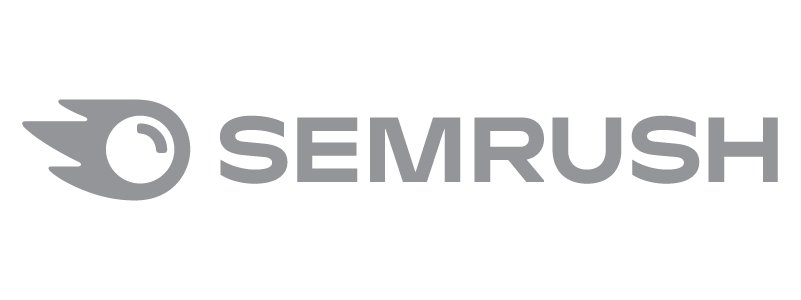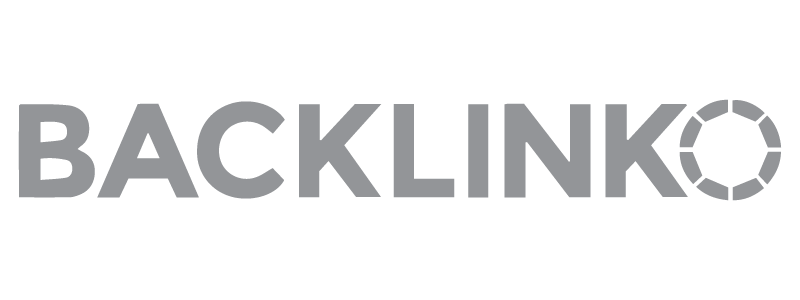When it comes to enterprise ecommerce platforms, there are only a handful of options available. When you first launched your online store, there were tons to choose from. You did your homework and found the perfect ecommerce platform for your needs.
BigCommerce is the most scalable enterprise ecommerce solution available for growing brands.
But, as your online business has grown, you’ve found that it’s just not working the way you want at scale. You need something that can keep up with the current ecommerce trend, and adapt to future ones. Though migrating from one platform to another may be a hassle, it may be the answer you’re looking for.
How do you know you’re ready for the upgrade? If your business is established and earning seven to eight figures a year, then it’s time to consider it. But remember, these are priced accordingly, and your cost of ownership will increase. Enterprise software typically starts at $1,000 a month but can cost upwards of 10s of thousands a month.
7 Best Enterprise Ecommerce Platforms
If you’re not at this level yet, you might want to choose a more beginner-friendly ecommerce platform.
To help make the process of choosing the right platform for your needs a bit easier on you, I’ve compiled this buyer’s guide with the seven best options out there. I’ve tested each of them and will use my data and personal experience to help guide you.
Benefits of Using Enterprise Ecommerce Software
If you’re thinking you can just keep using the regular platform you’ve always used, I’m here to tell you that it won’t work out in the long run, and could even backfire. You wouldn’t host a wedding with 300 guests in your living room, would you? You wouldn’t have enough room to keep things running smoothly for everyone – and expecting a basic shopping cart software and payment gateway to function the same way enterprise ecommerce platforms do is not practical.
- Avoid Downtime: One of the quickest ways to lose business is downtime. Even a delay in milliseconds is enough to send your customers to the competition. You need a platform that’s robust enough to work fast all the time.
- More Control Over the User Experience: Today’s consumers are savvy when it comes to shopping online. User experience can be the differentiator for them and with enterprise ecommerce, you have more flexibility to customize and personalize the customer experiences you want your brand to become known for.
- Improved Security: Keeping your customer data secure is crucial for earning their trust. Whether you opt to use a hosted ecommerce platform that handles security for you or handle it yourself, you must ensure you have top-notch security. Failure to do so could leave you susceptible to major financial, legal, and brand risks.
- Automation: At scale, things like inventory management become harder to manage manually. With advanced features like automation, you can improve business processes while avoiding potentially costly inefficiencies like overselling, understocking, and wasted time.
Types of Enterprise Ecommerce Solutions

On-Site
You’ll host the ecommerce platform for your online store yourself. Because the software is open-source, you’ll be able to modify it as much as you need so that you can meet all your needs. This was the standard option for online retailers running an enterprise business for the simple fact that the degree of flexibility was ideal for large scale operations. However, the cost of ownership is often much higher than with hosted ecommerce platforms, since you have to maintain the servers and the software.
This approach means you’ll need to do more programming, but it’s likely your company has programmers at its disposal to help with software customization. If, however, maintaining an IT department isn’t on your priority list, an on-site ecommerce website probably isn’t the best choice for you. If your main goal is to have a highly customizable option, you’ll enjoy its flexibility.
Cloud-Based
Cloud-based networks make it possible to store your website on the cloud, rather than on a local computer network. There are a number of options to choose from, any of which could work, depending on your needs and preferences.
Open-Source Cloud-Based
Using an open-source cloud-based platform for ecommerce, your company owns and can modify the code. You maintain a great deal of control over the servers and the software.
Like with on-site platforms for ecommerce, you’ll be responsible for a lot of details, including website security. If you don’t have, or don’t plan to invest in a strong IT department, relying on an open-source ecommerce platform likely isn’t the right choice for you. It can be time-consuming to manage and increases the risk of costly mistakes.
Software-as-a-Service (SaaS)
A SaaS platform is a popular alternative for many B2B and B2C companies because you can get the ecommerce functionality you need, with less hassle compared to hosting and managing everything yourself. Generally speaking, it comes at a lower cost of ownership, too. Instead of purchasing the platform altogether, you’re purchasing the platform hosting and management from another company.
While this option means you’ll have less control over the code, you won’t need to do as much to maintain your website. If you’d rather invest more of your budget in marketing tools, customer service, and other areas of your company, you’ll appreciate what this ecommerce solution offers.
Headless
Headless commerce is a type of SaaS platform that offers an alternative to the traditional interdependent system. The site architecture is more flexible to allow for customization and automation where you want it.
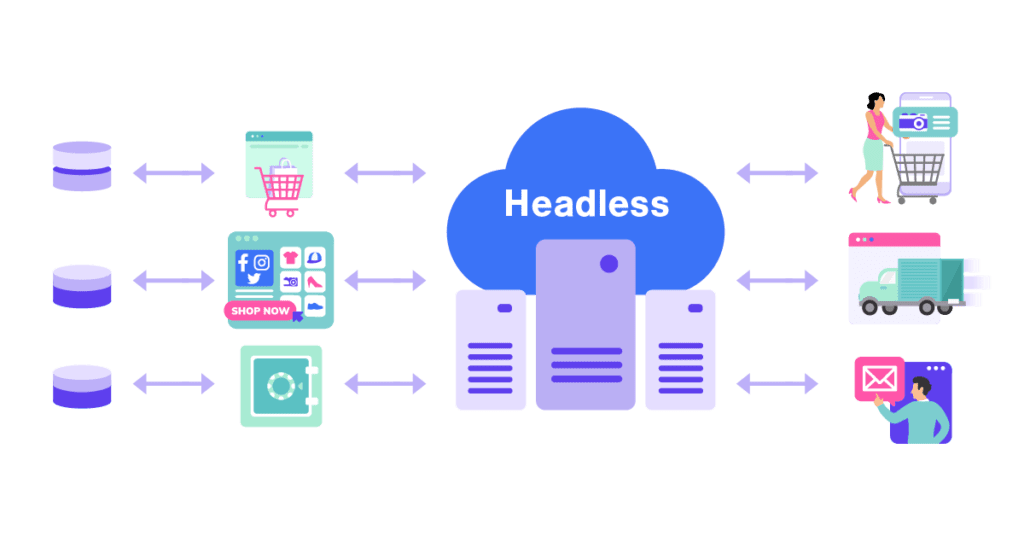
“Heads” such as customer transitions, product catalog tools, employee support, etc. can be attached how you want them to be, and remain completely separate from your ecommerce store. This translates to more freedom with and control over customer interactions without having to control areas you’d rather be automated. With this, comes the option to cut off a “head” without negatively impacting other areas of your website.
Headless sites can move faster, and may even be more cost-effective than option options. As a result, they are rapidly becoming more popular for all kinds of digital commerce.
How to Select an Enterprise Ecommerce Platform for Your Business
You’ll need to make compromises when selecting the right ecommerce platform for your business. The option that provides the best features will likely come at a higher price point. The solution that is easiest to use may not provide all the features you need. Prioritize your goals and choose the ecommerce platform that makes it easier for you to accomplish them.
- Increase revenue
- Decrease costs
- Better user interface
- Large-scale business needs
- Flexibility and speed
- Easy to use to improve your sites
- Reports data in real-time
- Multi-store support
- Supports payment gateways
What Problems Do You Have Now?
If you’re making the switch from another ecommerce platform, consider the reasons why. Understanding the major pain points with your current systems will go a long way in helping you determine what you want and need from a new system. Common reasons for switching include:
- Loss of revenue as a result of system failures or needing to divert manpower into solving problems
- Crashes during peak times
- Important systems don’t easily integrate with your platform
- Lack of confidence in data security
- Unsatisfied with server performance
- Your conversion rates are lower than industry benchmarks
What to Consider in a New System

Cost
It’s no real surprise that an enterprise system is more expensive than the less powerful system you’re currently operating with. To survive in today’s competitive ecommerce marketplace, you need the power to support operations.
Your chosen features will also affect prices. An open-source ecommerce platform is generally the most expensive option since you’ll have increased IT expenses to maintain, along with licensing costs.
Opting for a SaaS ecommerce platform is typically less expensive in terms of initial investment and maintenance costs, but in exchange, the ecomm platforms offer less flexibility. If control over the entire operation is what you need most, prepare to pay more.
Performance
Your website needs to work consistently, especially when there’s a spike in activity due to a sale, holiday, or other promotion. If the increased traffic bogs servers down and causes the site to load slowly, or worse, not at all, you’ll lose customers – and revenue.
Your platform must be able to run quickly and efficiently all the time, but if you know you’ll have seasonal spikes, choose a platform that will be able to handle it so that your customer experience remains as it should.
Security
Security has to be one of your top priorities because if you fall victim to a data breach, you will suffer financially. You’ll have to pay for IT to find and fix the security issue that led to the breach, possibly pay for the legal consequences of said breach, and do damage control on your reputation.
Opting for an open-source platform means you’ll be responsible for your own website security. Using a SaaS solution, however, means security and PCI compliance are handled for you.
Mobile
Your ecommerce website has to function as well on a mobile device as it does on a desktop, even if your company doesn’t receive a lot of orders from mobile sales. It may not be a priority if most of your customers visit your website from a computer, but as mobile traffic outpaced desktop internet traffic years ago, creating a consistent experience across devices is essential.
SEO and Website Builder
I’ve found that many platforms, even at the enterprise level overlook the importance of SEO. Many lack built-in features and require third-party integrations to optimize your website. Even if you’ve got your SEO under control, but expect your ecommerce site to do it all, SEO is crucial.
Integration
Every business has different integration needs for their website. Depending on what your ecommerce platform offers, you may need third-party integrations to take care of additional features for you.
Make a comprehensive list of all the third-party services you work with, such as your fulfillment centers, drop shippers, accounting software, etc. to be sure your chosen platform integrates with it.
Support for Multi-Channel Sales
With growth may come the decision to expand your business beyond ecommerce. Whether you want to open a brick and mortar store, branch out to social media selling, or manage multiple online stores on a single platform, choose a platform that is ready to handle your diversification.
Best Enterprise Ecommerce Platforms to Choose From
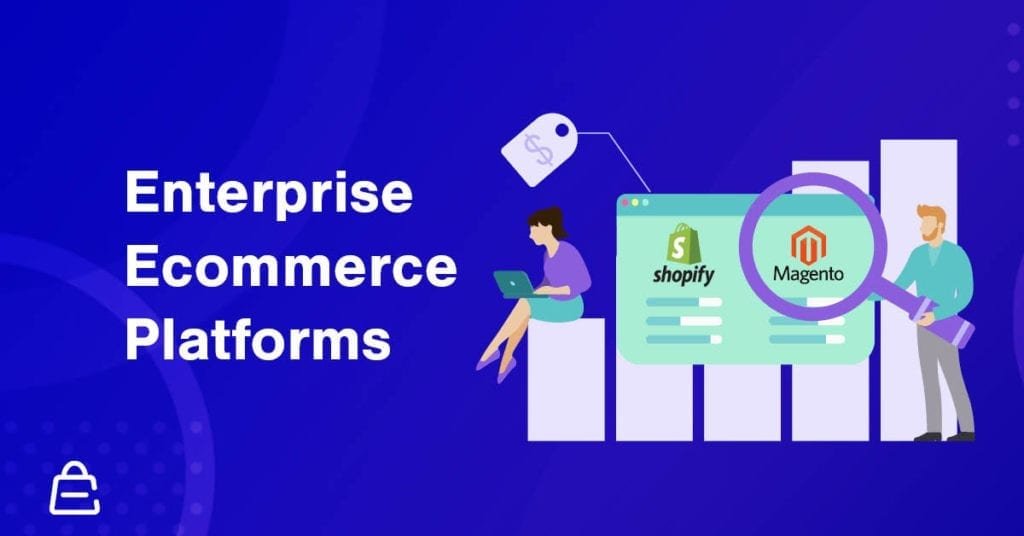
BigCommerce Enterprise
BigCommerce is well known for its solution for small and medium businesses. If you already like BigCommerce, you’ll appreciate what it has to offer for enterprise ecommerce.
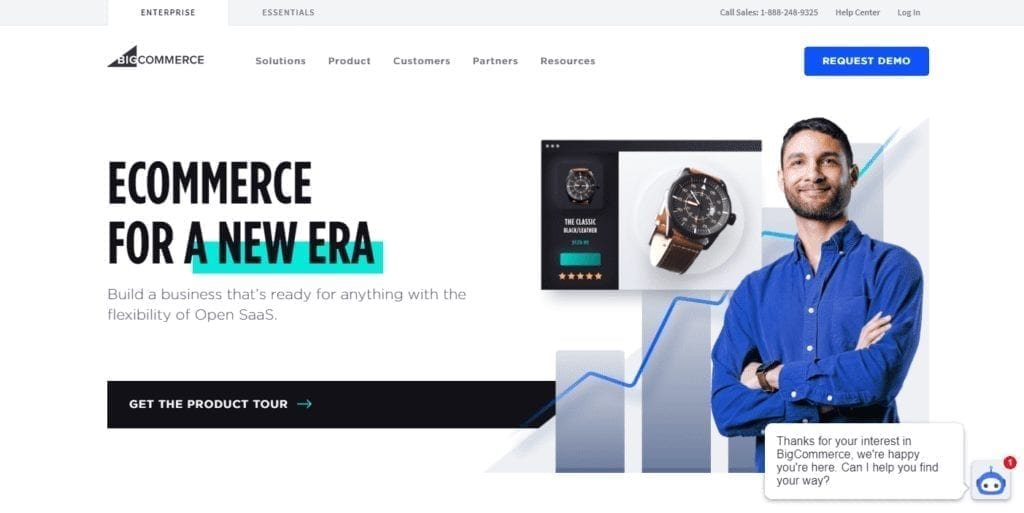
BigCommerce Enterprise Pricing
BigCommerce doesn’t provide pricing information for its enterprise plan, because the price you pay is based on your online sales volume. To determine the pricing for your online store, you have to contact a sales rep to get a custom quote. Expect to spend at least $400 per month. If you want more information about BigCommerce, read my review.
BigCommerce Enterprise Pros
- Priority support
- Staging development environment
- Custom filtering options
- Dedicated account manager
- Headless commerce
- Cross-channel commerce
- Works with many payment gateways
BigCommerce Cons
- Pricing based on sales volume – the more you make, the more you’ll pay.
- May require a contract
BigCommerce Enterprise offers 99.9% uptime and can handle any major traffic spikes due to seasonal business or promotions you offer. It’s a great solution for both B2B and B2C customers, as it offers features like bulk pricing, punch out, and quote management. With a vast array of integrations like WordPress, CRM tools, an ERP system, and more, if you use it in your business, BigCommerce can likely work with it. And if not, API access makes it easier to connect.
Brands Using BigCommerce Enterprise
- SkullCandy
- Sony
- QVC
- Paul Mitchell
Shopify Plus
If you’re impressed with what Shopify offers its users on its regular plans, you’ll likely be happy with what the enterprise plan has to offer.
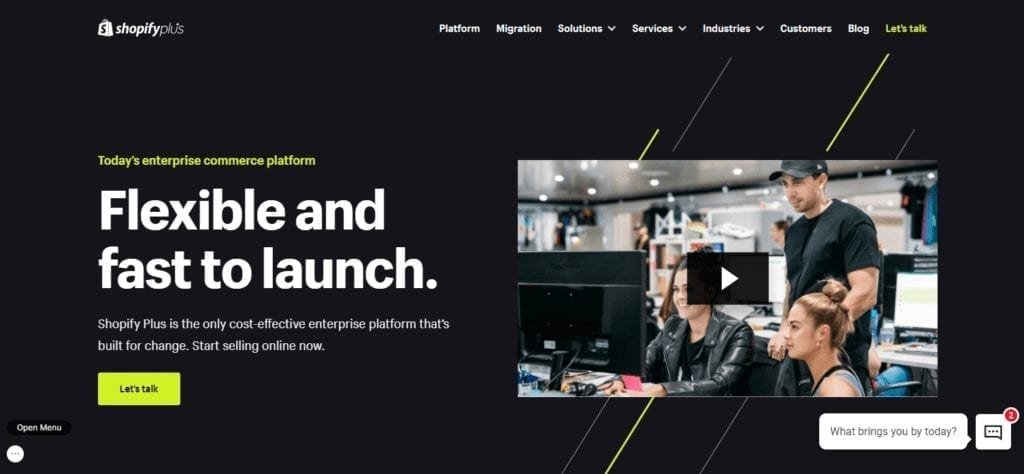
Shopify Plus Pricing
If you’ve read my Shopify review, you know upgrading to the Shopify Plus plan means you’ll spend a minimum of $2,000 per month. Which is worth it for an enterprise ecommerce business. If you want something beginner friendly, you could look at Wix.
Shopify Plus Pros
- Fully Hosted: It’s easy to get started because you don’t have to worry about coding, security, or bandwidth.
- Cost-Effective: Even at $2,000+ per month, Shopify Plus is often more affordable than the cost of hiring a web development agency or keeping programmers on your in-house staff. Customer support is available 24/7, and you’ll have a dedicated account manager to help you whenever you need it.
- Easily Handle Sales Increases: Shopify Plus can process 10,000 transactions per minute, so when you’re launching a new product or hosting a killer sale, you never have to worry.
- Extensive Plugin Library: What you can’t do natively with Shopify’s ecommerce platform, you can find a plugin to do it. There are over 1,500 apps that will integrate with your website and address everything from marketing to customer service and order fulfillment.
Shopify Plus Cons
- Plugins Can Get Expensive: The more features you add with premium plugins, the more your monthly costs will rise. Since the platform doesn’t offer as many built-in tools as BigCommerce, for instance, you may find yourself spending more than you would by the time you add the plugin costs to the plan payment every month.
- Limited Flexibility: You can customize your code through apps or by hiring a Shopify developer, but unlike other enterprise ecommerce platforms like Adobe Commerce, you cannot create custom designs from scratch. It’s important to remember, however, that this applies to any hosted platform, not just Shopify.
If you’re already using another Shopify plan, you’ll be familiar with everything because it uses the same dashboard and editor. The difference is not in how it works, but what it can do. The Shopify Plus plan gives you access to a shopping script to configure more precise shipping rates so you can change your shipping options based on cart contents, customer tags, or minimum order value. You have more control over setup and customization in general.
Brands Using Shopify Plus
- Nestle
- GE
- Unilever
- Pepsi
Salesforce Commerce Cloud
The Salesforce Commerce Cloud, formerly known as Demandware goes beyond ecommerce features to cover mobile-first point-of-sale (POS), and predictive intelligence in a single platform. You must own more than five online stores to qualify for the enterprise level.
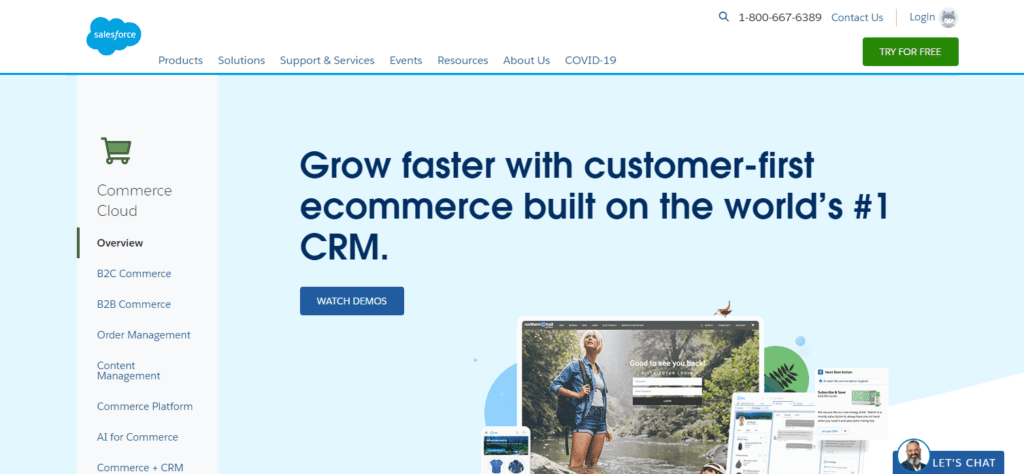
Salesforce Commerce Cloud Pricing
Salesforce Commerce Cloud offers both B2B and B2C Commerce pricing plans. The pricing is customized based on your needs and requires a consultation with a member of the sales team. Expect to pay between 1% and 2% of your sales.
Salesforce Commerce Cloud Pros
- Integration: If you use any other Salesforce software, you can integrate your store with its cloud-based customer relationship management (CRM) software to build consistency across your business.
- Optimal Choice for International Brands: You can easily manage multiple storefronts from a single backend while accepting different currency types and using different languages on each one of them.
- Customer Support: If you run into issues or have any questions, you can reach out to the customer support team who is available 24/7. The support team handles all core system upgrades so you don’t have to.
Salesforce Commerce Cloud Cons
- Requires Web Development Experience: If you lack web development experience, you’ll likely struggle to build a professional quality online store. It’s not an intuitive platform for those who don’t have any tech knowledge.
- Expensive: Since pricing is based on a percentage of your sales, the more money you make, the more money you spend. At certain points, it may be more cost-effective to consider other enterprise ecommerce platforms.
Salesforce Commerce offers omni channel selling, which makes it easier to manage and sell products online, through social media channels, your mobile site, and your brick-and-mortar storefront all from a centralized location.
Salesforce will also build customer information reports to provide insights about your customers’ shopping behavior. It has its own personalization engine, Einstein, which uses that data to personalize the shopping experience and increase sales.
Brands Using Salesforce Commerce Cloud
- Adidas
- L’Oreal USA
- Beats by Dre
- Otterbox
- Torrid
Adobe Commerce (Formerly Magento)
Adobe Commerce was purchased in 2018 by Adobe, for $1.68 billion. As a self-hosted platform, you have complete creative freedom, as long as you know what you’re doing with the code, or can hire people who do.
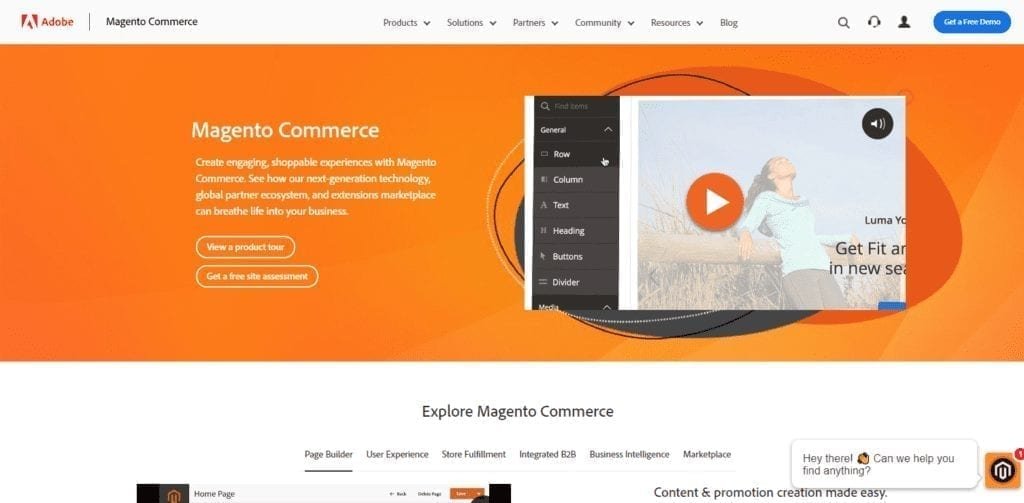
Adobe Commerce Enterprise Pricing
Adobe Commerce licensing fees start at around $1,988 per month, and this does not include your hosting, domain name, or website development costs, which could cost hundreds of thousands of dollars, depending on your needs.
Adobe Commerce Pros
- Integrations: The number of available third-party integrations is unmatched, which gives you comprehensive options for creative control.
- Advanced Features: Adobe Commerce was built with web developers in mind, rather than the business owner who wants to handle things themself. Because of this, there are complex and flexible features available.
- Developer Community: Rather than a 24/7 dedicated customer support team, Adobe Commerce users have to rely on a community of developers to assist them with any questions or issues. However, Adobe Commerce has the largest developer community in the ecommerce industry.
Adobe Commerce Cons
- Extra Costs: With Adobe Commerce, you must purchase your own hosting, security certificates, and domain name. These are included with BigCommerce and Shopify. Adobe Commerce also charges you anywhere between $1,000 to $5,000 if, during a security check, it finds vulnerabilities within your code.
- Expensive Migrations: Every few years, your store will be migrated to an updated version of the Adobe Commerce enterprise ecommerce platform. This is not only time-consuming but expensive.
- Declines with Scale: When you deal with a large transaction volume, you shouldn’t experience any declines in speed or issues because this can negatively affect your customer experience. Customers have complained about speeds slowing down and experiencing bugs when trying to scale up.
Like Shopify, Adobe Commerce includes a drag-and-drop design page builder and allows your customers to use previously stored payment and shipping information for faster checkout. With the product suggestion feature, you can set automated rules to determine which products will be recommended to certain customers and whether you want to suggest more expensive options or related products to increase sales. Being able to adjust content on the front-end visually is nice, but you’ll still need to code the backend.
Brands Using Adobe Commerce
- Toyota
- Ben & Jerry’s
- Gibson
- Kodak
SAP Hybris Commerce
SAP Hybris combines SAP commerce and CRM software to give you more control over the customer experience. It is not a single product like SAP ERP, but instead a group of products to make it easier for you to manage the entire customer engagement experience from end to end.
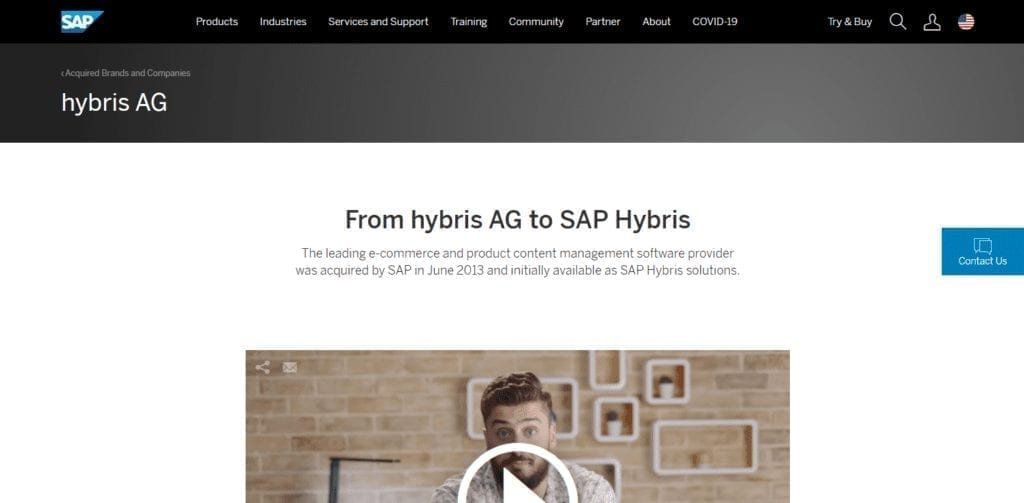
SAP Hybris Pricing
Pricing starts at $54,000 per year ($4,500 per month) and increases from there, depending on the complexity of your needs.
SAP Hybris Pros
- Omnichannel Marketing: Using data from online channels, internal and external databases, and data collected by staff, you can reach customers no matter where they are. Ultimately, this reduces your marketing costs because it cuts out redundant communication.
- Manage More Than Ecommerce: With the suite of products, you can go beyond the SAP Commerce Cloud and use the system to cover everything your ecommerce business needs, sales and customer support, marketing, customer information, and more.
- Salesforce Automation: This ecommerce platform integrates with Salesforce to make for easy automation.
SAP Hybris Cons
- Expensive: At nearly $5,000 per month to start, this platform is one of the most expensive options on the market today.
- May Have More Features Than Needed: Features are great, but there’s no need to pay for more than what you need. For a new enterprise company, the options could be overwhelming.
SAP Hybris aims to provide a flexible, highly customizable, all-in-one solution for your business. It includes:
- Customer data
- Commerce
- Marketing
- Service
- Sales
Brands Using SAP Hybris
- Sally Beauty Supply
- bareMinerals
- Radio Systems Corporation
Oracle Commerce Cloud
The Oracle Commerce Cloud, now known as Oracle CX Commerce, offers a full suite of integrated customer experience applications, similar to SAP Hybris.
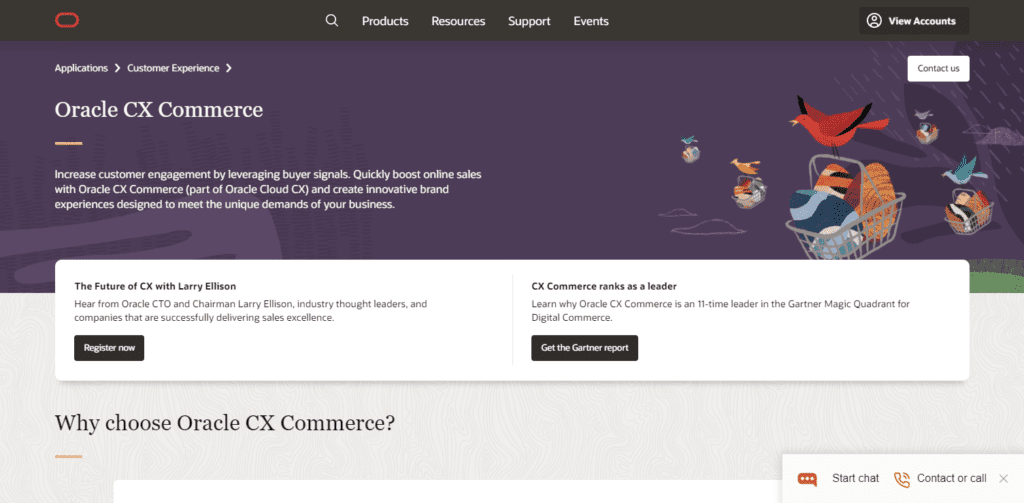
Oracle Commerce Cloud Pricing
Starts at $150,000.
Oracle Commerce Pros
- Great Mobile Experience: As more shoppers turn to mobile devices, a stellar experience is crucial. Oracle’s ecommerce platform offers one of the best mobile experiences out there.
- Handles End-to-End: The suite includes accounting, shipping, multi-store management, order processing, and more, so you can manage everything from a central location.
- Scalable: As your business grows, you’ll be able to scale easily so you always have the resources you need to serve your customers.
Oracle Commerce Cons
- Doesn’t Integrate With Major Online Marketplaces: If you want to sell on Amazon and eBay with ease, you’ll need to look elsewhere.
- Lacks Single-Click Checkout: If you want a streamlined checkout experience, you can customize it with Oracle, but can’t go with one-click checkout.
Oracle has a number of integrations, even outside of the Oracle product suite. This makes it easier to create a business process and workflow that’s efficient and cost-effective.
Brands Using Oracle Commerce
- Dollar Tree
- Shop Direct
- ZODIO
Adobe Commerce Cloud
Adobe acquired Magento, and based on that, launched a cloud-based enterprise ecommerce solution to integrate with the rest of Adobe’s tools. The Adobe Commerce Cloud (ACC) seeks to offer a fully integrated ecommerce platform that works well with its other cloud products, online marketplaces, and more.
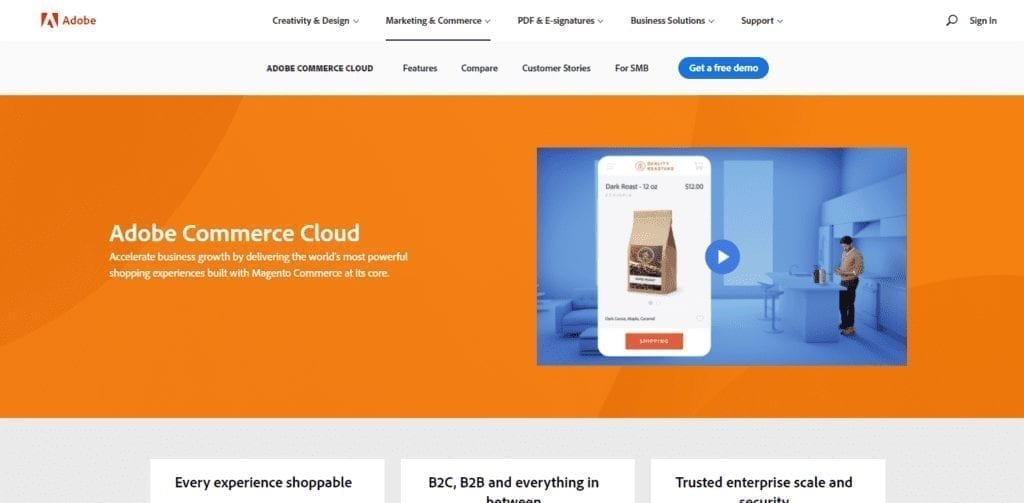
Adobe Commerce Pricing
ACC pricing is custom, based on your needs. You must speak with a sales representative to get a quote.
Adobe Commerce Pros
- Fully Integrated with Other Adobe Products: If your company uses other Adobe products in the Adobe Experience Cloud and likes Adobe Commerce, but you don’t want to handle hosting and security yourself, this is the perfect solution. You can deploy hybrid B2B ecommerce and B2C models, run multiple sites and brands, build web applications, and more.
- Works with Adobe Commerce Extensions: Because the platform uses Adobe Commerce, what works there will work with ACC.
- Highly Adaptable: With the drag and drop website builder, headless commerce options, and more, the platform can be customized to meet the needs of nearly any business.
Adobe Commerce Cons
- Costs Add Up Quickly: Depending on the number of team members you want to have access to the store, the cost could become quite expensive.
- Possibly Difficult for New Users: If you’re not already familiar with Adobe products, it may be a bit confusing. There are a lot of features and options, which may make it difficult to learn compared to other ecommerce platforms on the market today.
The ACC ecommerce solution can also help with customer data collection and analysis to motivate sales and increase customer loyalty. Existing Adobe Commerce customers can easily switch over to the cloud ecommerce platform if desired.
Brands Using Adobe Commerce Cloud
- HP
- TiVo
- Anheuser-Busch
- Neverfail Springwater
There is No Single Best Ecommerce Platform for All Enterprises
If there were, you’d not be reading this. When it comes to the “right” enterprise ecommerce solutions, the answer for you lies in your specific business needs, what the software can handle, and how it integrates with the rest of your processes. Ecommerce vendors aim to provide useful products to help you succeed with your online store, but no ecommerce platform is perfect for everyone. When making the choice for your online store, consider your budget, the cost of ownership, the third-party integrations you need, and the features that matter most to you. The best enterprise ecommerce solution is one that covers your needs and can continue to scale with you as you grow.








